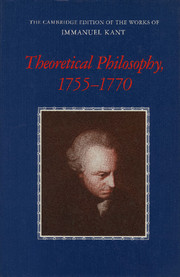Book contents
- Frontmatter
- Contents
- General editors' preface
- Preface
- Guide to abbreviations
- General introduction
- Introductions to the translations
- Résumés of the works
- A NEW ELUCIDATION OF THE FIRST PRINCIPLES OF METAPHYSICAL COGNITION (1755)
- Purpose of the undertaking
- Section 1 Concerning the principle of contradiction
- Section 2 Concerning the principle of the determining ground
- Section 3 Presentation of the two principles of metaphysical cognition
- THE EMPLOYMENT IN NATURAL PHILOSOPHY OF METAPHYSICS COMBINED WITH GEOMETRY, OF WHICH SAMPLE I CONTAINS THE PHYSICAL MONADOLOGY (1756)
- AN ATTEMPT AT SOME REFLECTIONS ON OPTIMISM (1759)
- THE FALSE SUBTLETY OF THE FOUR SYLLOGISTIC FIGURES (1762)
- THE ONLY POSSIBLE ARGUMENT IN SUPPORT OF A DEMONSTRATION OF THE EXISTENCE OF GOD (1763)
- ATTEMPT TO INTRODUCE THE CONCEPT OF NEGATIVE MAGNITUDES INTO PHILOSOPHY (1763)
- INQUIRY CONCERNING THE DISTINCTNESS OF THE PRINCIPLES OF NATURAL THEOLOGY AND MORALITY (1764)
- M. IMMANUEL KANT'S ANNOUNCEMENT OF THE PROGRAMME OF HIS LECTURES FOR THE WINTER SEMESTER 1765 — 1766 (1765)
- DREAMS OF A SPIRIT-SEER ELUCIDATED BY DREAMS OF METAPHYSICS (1766)
- CONCERNING THE ULTIMATE GROUND OF THE DIFFERENTIATION OF DIRECTIONS IN SPACE (1768)
- ON THE FORM AND PRINCIPLES OF THE SENSIBLE AND THE INTELLIGIBLE WORLD [INAUGURAL DISSERTATION] (1770)
- Factual notes
- Bibliographies of editions and translations
- Glossary
- Biographical-bibliographical sketches of persons mentioned by Kant
- Index
Section 2 - Concerning the principle of the determining ground
Published online by Cambridge University Press: 18 December 2014
- Frontmatter
- Contents
- General editors' preface
- Preface
- Guide to abbreviations
- General introduction
- Introductions to the translations
- Résumés of the works
- A NEW ELUCIDATION OF THE FIRST PRINCIPLES OF METAPHYSICAL COGNITION (1755)
- Purpose of the undertaking
- Section 1 Concerning the principle of contradiction
- Section 2 Concerning the principle of the determining ground
- Section 3 Presentation of the two principles of metaphysical cognition
- THE EMPLOYMENT IN NATURAL PHILOSOPHY OF METAPHYSICS COMBINED WITH GEOMETRY, OF WHICH SAMPLE I CONTAINS THE PHYSICAL MONADOLOGY (1756)
- AN ATTEMPT AT SOME REFLECTIONS ON OPTIMISM (1759)
- THE FALSE SUBTLETY OF THE FOUR SYLLOGISTIC FIGURES (1762)
- THE ONLY POSSIBLE ARGUMENT IN SUPPORT OF A DEMONSTRATION OF THE EXISTENCE OF GOD (1763)
- ATTEMPT TO INTRODUCE THE CONCEPT OF NEGATIVE MAGNITUDES INTO PHILOSOPHY (1763)
- INQUIRY CONCERNING THE DISTINCTNESS OF THE PRINCIPLES OF NATURAL THEOLOGY AND MORALITY (1764)
- M. IMMANUEL KANT'S ANNOUNCEMENT OF THE PROGRAMME OF HIS LECTURES FOR THE WINTER SEMESTER 1765 — 1766 (1765)
- DREAMS OF A SPIRIT-SEER ELUCIDATED BY DREAMS OF METAPHYSICS (1766)
- CONCERNING THE ULTIMATE GROUND OF THE DIFFERENTIATION OF DIRECTIONS IN SPACE (1768)
- ON THE FORM AND PRINCIPLES OF THE SENSIBLE AND THE INTELLIGIBLE WORLD [INAUGURAL DISSERTATION] (1770)
- Factual notes
- Bibliographies of editions and translations
- Glossary
- Biographical-bibliographical sketches of persons mentioned by Kant
- Index
Summary
DEFINITION
Proposition IV. To determine is to posit a predicate while excluding its opposite.
That which determines a subject in respect of any of its predicates, is called the ground. Grounds may be differentiated into those which are antecedently determining and those which are consequentially determining. An antecedently determining ground is one, the concept of which precedes that which is determined. That is to say, an antecedently determining ground is one, in the absence of which that which is determined would not be intelligible. A consequentially determining ground is one which would not be posited unless the concept which is determined by it had not already been posited from some other source. You can also call the former the reason why, or the ground of being or becoming, while the latter can be called the ground that, or the ground of knowing.
Proof of the reality of our definition. The concept of a ground, as it is commonly understood, establishes a connection and a conjunction between the subject and some predicate or other. A ground thus always requires a subject; and it also requires a predicate, which it can unite with the subject. If you ask for the ground of a circle I shall not at all understand what you are asking for unless you add a predicate, for example, that it is, of all the figures which have a perimeter of the same length, the one which embraces the greatest area. For example, suppose we seek for the ground of all evils in the world. We thus have the proposition: the world contains a number of evils. What is being sought is not the ground that, in other words, not the ground of knowing, for experience takes its place. What has to be specified is the ground why, that is to say, the ground of becoming.
Information
- Type
- Chapter
- Information
- Theoretical Philosophy, 1755–1770 , pp. 11 - 36Publisher: Cambridge University PressPrint publication year: 1992
